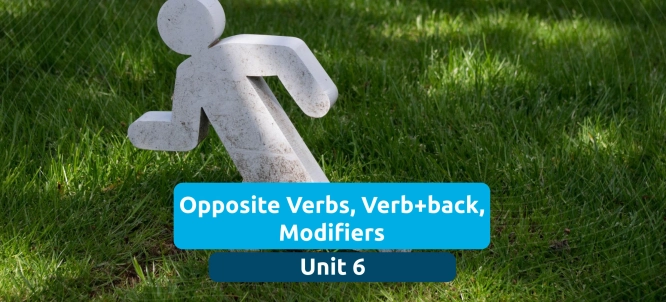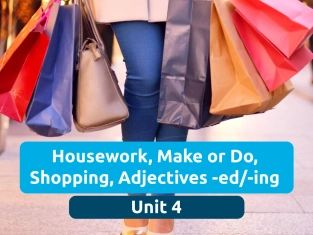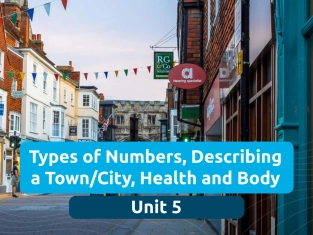by PushtoLearn
Unit 6 - Opposite Verbs, Verb+back, Modifiers
Table of Contents
Unit 6, English File Pre-Intermediate 4th - Exercises and Flashcards
These exercises focus on Unit 6, English File Pre-Intermediate 4th
Wordlist for Unit 6, English File Pre-Intermediate 4th
|
Word |
Example |
|
arrive |
What time will they arrive? |
|
borrow |
Can I borrow some money, please? |
|
break |
How did you break your glasses? |
|
buy |
I don't like renting. I want to buy a house. |
|
catch |
I need to catch the next train. |
|
fail |
Did he fail the exam? |
|
find |
Why can you never find your keys? |
|
finish |
I'll come back and finish the job tomorrow. |
|
forget |
Don't forget to send her a birthday card. |
|
get |
Do you think you'll get a good job in the future? |
|
learn |
Are you going to learn a new language next year? |
|
leave |
Please leave a message if I don't answer the phone. |
|
lend |
Can you lend me five dollars? |
|
lose |
They'll lose the match. They're terrible players. |
|
mend |
Can you mend my shirt? The button fell off. |
|
miss |
Did we miss the train? When is the next one? |
|
pass |
My parents will be so happy if I pass the exam. |
|
pull |
Push the door, don't pull it. |
|
push |
Push the door, don't pull it. |
|
receive |
Did you receive my email? |
|
remember |
Do you usually remember to give it back? |
|
repair |
Can you help me repair my bike? |
|
sell |
I want to sell my car and buy a new one. |
|
send |
I need to send an email to John before the end of the day. |
|
start |
What time does it start? |
|
teach |
I'm going to China to teach English. |
|
turn off |
Turn off the light. I want to get some sleep. |
|
turn on |
Can you turn on the TV? There's something I want to watch. |
|
win |
I hope we'll win this match. |
|
download |
I'm going to download a film to watch. |
|
drop off |
Can you drop me off at the station, please? |
|
hate |
I hate bad weather. |
|
love |
I love going on holiday. |
|
pick up |
Could you pick us up from the airport, please? |
|
upload |
I'll upload a few photos. |
|
Definitely. |
Are you coming to the party tonight? - Definitely. |
|
I doubt it. |
Do you think I would like this? - I doubt it. |
|
I hope not. |
Perhaps the plane will be delayed. - I hope not. |
|
I hope so. |
Do you think the weather will get better? - I hope so. |
|
I think so. |
Do you think you'll pass? - Yes, I think so. |
|
Maybe. |
Are you going to stay at home tonight? - Maybe. I'm not sure. |
|
Perhaps. |
Can you get to the airport in an hour? - Perhaps. It depends on the traffic. |
|
Probably. |
Will I enjoy this? - Probably. You like similar things. |
|
call you back |
I can't talk now. I'll call you back. |
|
give it back |
Give it back! It isn't yours. |
|
go back |
I'll go back to college after the holidays. |
|
pay you back |
Thanks for the money. I'll pay you back in a few days. |
|
send them back |
I bought these shoes online and they're small. I'll send them back. |
|
take it back |
I don't like this jacket. - Well, take it back to the shop. |
|
For example |
There are lots of types of music. For example, pop and rock. |
|
For instance |
It's easy to get here. For instance, you can get a train or a plane. |
|
I usually |
I usually like running because it's good exercise. |
|
it depends |
Do you enjoy studying? It depends on what we study. |
|
When… |
When I am tired, I go to bed. |
|
a bit |
This car is a bit cheaper than that car. |
|
incredibly |
That exam was incredibly difficult. I couldn't do anything! |
|
not very |
My flat is not very big, but I like it. |
|
quite |
It's quite expensive. Are you sure you want to buy it? |
|
really |
I'm really interested in this. I want to know more. |
|
very |
The room was very dark. |
|
agree |
I agree with you. |
|
complain |
Don't complain to me. I can't do anything. |
|
decide |
I can't decide what I want to do. |
|
depend |
Will you go to the beach? - It depends on the weather. |
|
happen |
What happens after we finish this book? |
|
invite |
Are you going to invite Harry to your party? |
|
offer |
He offered to help me. That was kind. |
|
practise |
She practises the guitar every day. |
|
prefer |
I prefer not to stay out late in the week. |
|
promise |
I promise to call you as soon as I arrive. |

Featured Vocabulary for Opposite Verbs, Verb + Back, Modifiers
Opposite Verbs
Win (verb)
-
Definition: To achieve victory in a contest or competition.
-
Example: She worked hard to win the championship.
-
Explanation: Knowing "win" is essential when discussing achievements or success.
Lose (verb)
-
Definition: To fail to keep or to be defeated in a competition.
-
Example: They might lose the game if they don't focus.
-
Explanation: "Lose" contrasts directly with "win," helping to express failure or setbacks.
Buy (verb)
-
Definition: To acquire something by paying for it.
-
Example: I plan to buy a new phone next week.
-
Explanation: Understanding "buy" is crucial in everyday transactions and commerce.
Sell (verb)
-
Definition: To exchange something for money.
-
Example: He decided to sell his old car.
-
Explanation: "Sell" contrasts with "buy," offering vocabulary for financial exchanges.
Verb + Back
Give back (verb)
-
Definition: To return something to its original owner.
-
Example: She promised to give back the book tomorrow.
-
Explanation: "Give back" emphasizes returning what was borrowed or taken.
Take back (verb)
-
Definition: To retrieve or recover something previously given.
-
Example: He decided to take back the jacket he lent her.
-
Explanation: "Take back" is used to discuss reclaiming items.
Call back (verb)
-
Definition: To return a phone call.
-
Example: I'll call back once I'm free.
-
Explanation: Helps in daily communication when discussing missed calls.
Modifiers
Very (adverb)
-
Definition: Used to emphasize the degree of an adjective or adverb.
-
Example: The test was very difficult.
-
Explanation: "Very" enhances descriptions, making them more precise.
Extremely (adverb)
-
Definition: To an exceptional or high degree.
-
Example: He was extremely pleased with the results.
-
Explanation: A stronger modifier than "very," useful for intensifying expressions.
Quite (adverb)
-
Definition: To a moderate or considerable extent.
-
Example: The room was quite large for a studio apartment.
-
Explanation: Offers subtle emphasis, useful for neutral or understated descriptions.
FAQ
What is the difference between "win" and "lose"?
"Win" means achieving victory or success, while "lose" refers to failing in a competition or missing out on something.
How is "give back" different from "take back"?
"Give back" involves returning something to its original owner, while "take back" refers to reclaiming something that was previously given.
When should I use "very" vs. "extremely"?
Use "very" for general emphasis and "extremely" for a stronger, more intense emphasis. For example, "very hot" is milder than "extremely hot."
Can "quite" mean both "very" and "moderately"?
Yes, "quite" can mean both depending on context. In British English, it often means "moderately," while in American English, it can mean "very."

